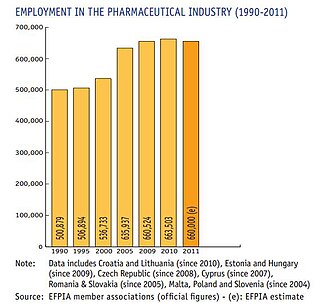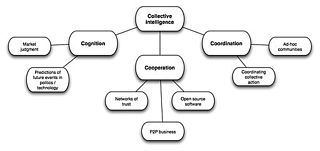Related Research Articles
In business theory, a disruptive innovation is an innovation that creates a new market and value network and eventually disrupts an existing market and value network, displacing established market-leading firms, products, and alliances. The term was defined and first analyzed by the American scholar Clayton M. Christensen and his collaborators beginning in 1995, and has been called the most influential business idea of the early 21st century.
Innovation in its modern meaning is a "new idea, creative thoughts, new imaginations in form of device or method". Innovation is often also viewed as the application of better solutions that meet new requirements, unarticulated needs, or existing market needs. Such innovation takes place through the provision of more-effective products, processes, services, technologies, or business models that are made available to markets, governments and society. An innovation is something original and more effective and, as a consequence, new, that "breaks into" the market or society. Innovation is related to, but not the same as, invention, as innovation is more apt to involve the practical implementation of an invention to make a meaningful impact in the market or society, and not all innovations require an invention. Innovation often manifests itself via the engineering process, when the problem being solved is of a technical or scientific nature. The opposite of innovation is exnovation.
Business intelligence (BI) comprises the strategies and technologies used by enterprises for the data analysis of business information. BI technologies provide historical, current and predictive views of business operations. Common functions of business intelligence technologies include reporting, online analytical processing, analytics, data mining, process mining, complex event processing, business performance management, benchmarking, text mining, predictive analytics and prescriptive analytics. BI technologies can handle large amounts of structured and sometimes unstructured data to help identify, develop and otherwise create new strategic business opportunities. They aim to allow for the easy interpretation of these big data. Identifying new opportunities and implementing an effective strategy based on insights can provide businesses with a competitive market advantage and long-term stability.
The knowledge economy is the use of knowledge to generate tangible and intangible values. Technology, and in particular, knowledge technology, helps to incorporate part of human knowledge into machines. This knowledge can be used by decision support systems in various fields to generate economic value. Knowledge economy is also possible without technology.
Collaborative intelligence characterizes multi-agent, distributed systems where each agent, human, or machine is uniquely positioned with autonomy to contribute to a problem-solving network. Collaborative autonomy of organisms in their ecosystems makes evolution possible. Natural ecosystems, where each organism's unique signature is derived from its genetics, circumstances, behavior and position in its ecosystem, offer principles for design of next generation social networks to support collaborative intelligence, crowd-sourcing individual expertise, preferences, and unique contributions in a problem-solving process.
Knowledge workers are workers whose main capital is knowledge. Examples include programmers, physicians, pharmacists, architects, engineers, scientists, design thinkers, public accountants, lawyers, and academics, and any other white-collar workers, whose line of work requires the one to "think for a living".
Problem solving consists of using generic or ad hoc methods in an orderly manner to find solutions to problems. Some of the problem-solving techniques developed and used in philosophy, artificial intelligence, computer science, engineering, mathematics, or medicine are related to mental problem-solving techniques studied in psychology.

The Wisdom of Crowds: Why the Many Are Smarter Than the Few and How Collective Wisdom Shapes Business, Economies, Societies and Nations, published in 2004, is a book written by James Surowiecki about the aggregation of information in groups, resulting in decisions that, he argues, are often better than could have been made by any single member of the group. The book presents numerous case studies and anecdotes to illustrate its argument, and touches on several fields, primarily economics and psychology.
Social peer-to-peer processes are interactions with a peer-to-peer dynamic. These peers can be humans or computers. Peer-to-peer (P2P) is a term that originated from the popular concept of the P2P distributed computer application architecture which partitions tasks or workloads between peers. This application structure was popularized by file sharing systems like Napster, the first of its kind in the late 1990s.
Private Sector Development (PSD) is a term in the international development industry to refer to a range of strategies for promoting economic growth and reducing poverty in developing countries by building private enterprises. This could be through working with firms directly, with membership organisations to represent them, or through a range of areas of policy and regulation to promote functioning, competitive markets.
Organizational Intelligence (OI) is the capability of an organization to comprehend and conclude knowledge relevant to its business purpose. In other words, it is the intellectual capacity of the entire organization. With relevant organizational intelligence comes great potential value for companies and therefore organizations find study where their strengths and weaknesses lie in responding to change and complexity. Organizational Intelligence embraces both knowledge management and organizational learning, as it is the application of knowledge management concepts to a business environment, additionally including learning mechanisms, comprehension models and business value network models, such as the balanced scorecard concept. Organizational Intelligence consists of the ability to make sense of complex situations and act effectively, to interpret and act upon relevant events and signals in the environment. It also includes the ability to develop, share and use knowledge relevant to its business purpose as well as the ability to reflect and learn from experience

The European Federation of Pharmaceutical Industries and Associations (EFPIA) is a Brussels-based trade association founded in 1978 representing the research-based pharmaceutical industry operating in Europe.
Knowledge sharing is an activity through which knowledge is exchanged among people, friends, families, communities, or organizations.
A knowledge organization is a management idea, describing an organization in which people use systems and processes to generate, transform, manage, use, and transfer knowledge-based products and services to achieve organizational goals.
Innovation management is a combination of the management of innovation processes, and change management. It refers to product, business process, and organizational innovation. Innovation management is the subject of ISO 50500 series standards developed by ISO TC 279.

Collective intelligence (CI) is shared or group intelligence that emerges from the collaboration, collective efforts, and competition of many individuals and appears in consensus decision making. The term appears in sociobiology, political science and in context of mass peer review and crowdsourcing applications. It may involve consensus, social capital and formalisms such as voting systems, social media and other means of quantifying mass activity. Collective IQ is a measure of collective intelligence, although it is often used interchangeably with the term collective intelligence. Collective intelligence has also been attributed to bacteria and animals.
References
- ↑ http://stuff.mit.edu/people/evhippel/papers/Knowhow%20Trading.pdf Hippel on Know-How trading